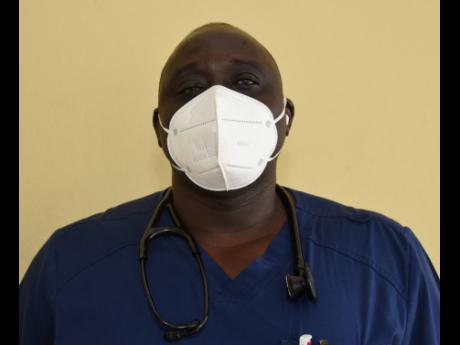COVID BED CRISIS
UHWI ‘bursting at the seams’
Surging admissions of COVID-19 patients have sparked a bedspace crisis at the University Hospital of the West Indies (UHWI) — a snapshot in a montage of malady threatening healthcare services across Jamaica which is in the throes of a third wave of...
Surging admissions of COVID-19 patients have sparked a bedspace crisis at the University Hospital of the West Indies (UHWI) — a snapshot in a montage of malady threatening healthcare services across Jamaica which is in the throes of a third wave of the new coronavirus.
Limited bed capacity has forced healthcare personnel to take drastic steps, including having suspected COVID-19 patients wait outside in tents until accommodation becomes available.
The troubling revelation by Dr Adedamola Soyibo, nephrologist and COVID-19 consultant at the UHWI, gives insight into the swift change of fortunes in Jamaica’s management of the crisis since the relaxation of restrictions on July 1.
Soyibo said that there has been a “dramatic increase” in the number of patients admitted for coronavirus-related pneumonia.
The consultant said that he was alarmed at July’s soaring hospitalisations, especially the pace at which the UHWI transitioned from low to full capacity.
“Within a span of two to three weeks, we started bursting at the seams. Right now, we even have patients outside in tents waiting to be admitted,” the physician said.
Between June 29 and August 3, the number of persons hospitalised at the UHWI increased from 11 to 48.
The upshot: Wards 7 and 8, the Accident and Emergency Department, the intensive care unit, and the medical intensive care unit are all at full capacity for COVID-19 treatment.
The hospital is also grappling with a backlog in the isolation area of the emergency room.
The escalation of COVID-19 admissions is likely to have severe implications, including pressure on front-liners who have been fatigued by the pandemic over the last 16 months.
Elective surgeries — those not considered emergencies — are likely to be first on the chopping block as the UHWI scales back its services — a trend that is expected to ripple across the health sector as other public hospitals grapple with the emerging crisis.
That means that outpatients with hypertension, diabetes, and the full gamut of non-communicable diseases will be at risk of delayed treatment that could be the difference between life and death — or worsening complications.
To ameliorate the bedspace shortage at the UHWI, Ward 3 is currently being prepared to accommodate COVID-19 patients. That decision means that resources and personnel will have to be diverted away from other facilities already in need, putting a strain on hospital services.
“Ward 3 is full. We have to move out all of those patients to where, I don’t know, to now accommodate more COVID patients … ,” Soyibo told The Gleaner.
“The same is for the doctors and the nurses. If you open up, you will have to start pulling staff from everywhere to be able to look after these people.”
A review of the demographic profile of patients is consistent with analysis of national data since the virus was first detected in Jamaica in March 2020: mainly elderly or those affected by comorbidities.
But Soyibo is concerned that many young persons are transmitting the virus to older persons. An even more worrying observation is that only one COVID-19 patient is partially vaccinated.
As at Monday, Jamaica recorded 53,543 overall infections and 1,203 deaths.
Data for July 31 present a jarring benchmark of how badly — and how quickly — the COVID-19 picture has darkened for Jamaica.
The 187 hospitalisations were the highest since May 8. The positivity rate of 31 per cent was at the highest point since April 6. The 342 new cases registered represented the highest volume since the 381 recorded on April 10.

